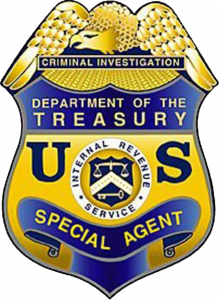Tax Consequences of Federal Rescheduling for Cannabis Businesses
by Omar Figueroa & Lauren Mendelsohn
May 2, 2024

Badge of Internal Revenue Service Special Agent
We recently wrote that the Drug Enforcement Administration will move to reclassify marijuana as a Schedule III controlled substance. A recent update by the Congressional Research Service makes clear that rescheduling is predicted to result in significant federal tax relief to cannabis businesses, which will be able to deduct their ordinary and usual business expenses such as rent and wages:
The prohibition on business deductions in Section 280E of the Internal Revenue Code applies to any trade or business that “consists of trafficking in controlled substances (within the meaning of schedule I and II of the Controlled Substances Act) which is prohibited by Federal law or the law of any State in which such trade or business is conducted.” Because the provision applies only to activities involving substances in Schedule I or II, moving marijuana from Schedule I to Schedule III would allow marijuana businesses to deduct business expenses on federal tax filings.
The plain language of 26 USC §280E makes clear that it only applies to controlled substances listed in schedule I and II of the Controlled Substances Act:
§280E. Expenditures in connection with the illegal sale of drugs
No deduction or credit shall be allowed for any amount paid or incurred during the taxable year in carrying on any trade or business if such trade or business (or the activities which comprise such trade or business) consists of trafficking in controlled substances (within the meaning of schedule I and II of the Controlled Substances Act) which is prohibited by Federal law or the law of any State in which such trade or business is conducted.
Because 280E does not apply to businesses trafficking in Schedule III controlled substances, rescheduling would make 280E inapplicable.
While cannabis remains a Schedule I controlled substance, business expenses cannot be deducted; however, as the Internal Revenue Service notes in its Cannabis Industry Frequently Asked Questions, “Section 280E does not, however, prohibit a participant in the marijuana industry from reducing its gross receipts by its properly calculated cost of goods sold to determine its gross income.”
Once cannabis is no longer a Schedule I controlled substance, Section 280E of the Internal Revenue Code will be inapplicable and complicated Cost of Goods Sold (COGS) calculations will no longer be necessary. In the long run, accounting for cannabis businesses will be streamlined.
More importantly, cannabis businesses unburdened by 280E will be significantly more profitable. As the National Cannabis Industry Association noted in IRC Section 280E: An Unjust Burden on State-Legal Cannabis Businesses, with 280E, the effective tax rate on cannabis companies “is often in excess of 70%” and at times “the federal tax burden for cannabis businesses actually exceeds net profits.”
Significantly, there will be increased economic activity in the cannabis space which will positively benefit ancillary businesses (such as marketing firms, advertising agencies, law firms, accountants, and consultants) and trade organizations, particularly since payments to ancillary businesses and trade organizations could qualify as business deductions.
The recent Congressional Research Service update can be downloaded here and viewed below:
CRS Legal Consequences of Rescheduling
This information is intended as a public educational service and is not intended, nor should be construed, as legal advice. For specific questions about the reclassification of cannabis under the Controlled Substances Act (CSA), please contact the Law Offices of Omar Figueroa at 707-829-0215 or info@omarfigueroa.com to schedule a confidential legal consultation.
